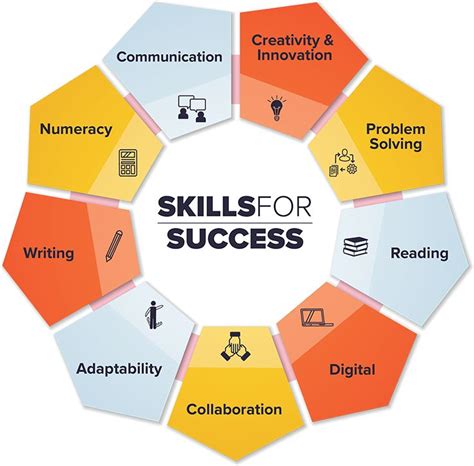In today's fast-paced and competitive job market, having the right skills is crucial for career success. Employers are looking for individuals who possess a combination of skills that can help them drive business results, innovate, and stay ahead of the curve. Whether you're just starting your career or looking to advance in your current role, it's essential to identify and develop the skills that will set you apart from others.
What are Essential Skills?
Essential skills are the abilities and knowledge that are required to perform a job effectively. They can be broadly categorized into two types: soft skills and hard skills. Soft skills are personal attributes and personality traits that enhance an individual's ability to interact and work with others, while hard skills are technical skills that are specific to a particular job or industry.

Some examples of essential skills include:
- Communication skills
- Teamwork and collaboration
- Problem-solving and analytical skills
- Time management and organization
- Leadership and management
- Adaptability and flexibility
- Technical skills specific to the job or industry
Importance of Essential Skills in the Workplace
Having essential skills is crucial for success in the workplace. Here are some reasons why:
- Improved job performance: Essential skills enable employees to perform their jobs more efficiently and effectively, leading to better job performance and higher productivity.
- Enhanced career prospects: Developing essential skills can enhance career prospects and open up new opportunities for advancement.
- Better teamwork and collaboration: Essential skills like communication and teamwork enable employees to work more effectively with others, leading to better teamwork and collaboration.
- Increased job satisfaction: Having essential skills can lead to increased job satisfaction, as employees feel more confident and capable in their roles.

Applications of Essential Skills in the Workplace
Essential skills have a wide range of applications in the workplace. Here are some examples:
- Leadership and management: Essential skills like leadership and management are critical for success in leadership roles. They enable leaders to inspire and motivate others, make informed decisions, and drive business results.
- Communication and teamwork: Essential skills like communication and teamwork are critical for success in team-based environments. They enable employees to work effectively with others, communicate ideas and plans, and build strong relationships.
- Problem-solving and analytical skills: Essential skills like problem-solving and analytical skills are critical for success in many industries. They enable employees to analyze data, identify problems, and develop solutions.

Developing Essential Skills
Developing essential skills takes time and effort, but it's worth it. Here are some tips for developing essential skills:
- Identify areas for improvement: Identify areas where you need to improve and develop a plan to address those gaps.
- Seek feedback: Seek feedback from others on your strengths and weaknesses, and use that feedback to inform your development plan.
- Practice and apply: Practice and apply your skills in real-world situations to develop your skills and build your confidence.
- Seek training and development opportunities: Seek training and development opportunities to develop your skills and knowledge.

Conclusion
In conclusion, essential skills are critical for success in the workplace. They enable employees to perform their jobs more efficiently and effectively, enhance career prospects, and improve job satisfaction. By developing essential skills, employees can improve their performance, advance their careers, and achieve their goals.
We'd love to hear from you! What essential skills do you think are most important for career success? Share your thoughts in the comments below.






What are essential skills?
+Essential skills are the abilities and knowledge that are required to perform a job effectively. They can be broadly categorized into two types: soft skills and hard skills.
Why are essential skills important in the workplace?
+Essential skills are important in the workplace because they enable employees to perform their jobs more efficiently and effectively, enhance career prospects, and improve job satisfaction.
How can I develop essential skills?
+You can develop essential skills by identifying areas for improvement, seeking feedback, practicing and applying your skills in real-world situations, and seeking training and development opportunities.
